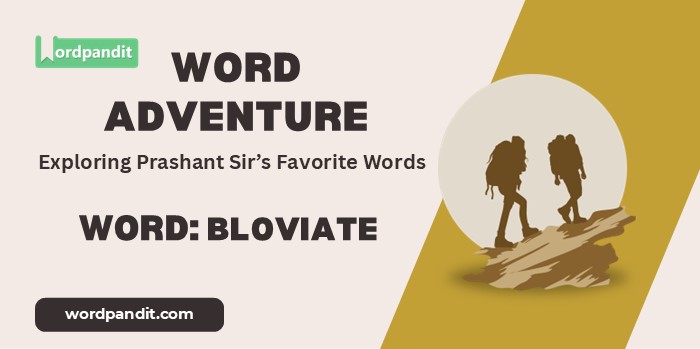Word Adventure: Bloviate
The Headline
“Bloviate: When Hot Air Meets Big Words in a Verbal Hurricane”
The Scoop
In the theater of English vocabulary, some words perform double duty as both description and commentary. ‘Bloviate’ is one such clever performer – a term that manages to mock the very kind of pompous speechifying it describes. Let’s explore this amusing word that puts windbags in their place.
Let’s Break It Down
The Plot Thickens
‘Bloviate’ emerged in mid-19th century America, during a time when pompous oratory was both common and increasingly ridiculed. The word itself seems to be a playful American creation, combining the word ‘blow’ (as in “full of hot air”) with a pseudo-scholarly Latin suffix.
The term gained particular prominence through its association with President Warren G. Harding, who was famous (or perhaps infamous) for his long-winded, grandiose speeches. Critics described his style as “bloviating,” and the word stuck as a perfect descriptor for unnecessarily elaborate rhetoric.
Today, ‘bloviate’ serves as a delightfully precise way to criticize those who substitute verbal flourish for substance, reminding us that sometimes less really is more.
Word in the Wild
The Twist
Here’s an ironic observation: in scholarly articles discussing the problem of bloviating in academic writing, authors sometimes find themselves bloviating about bloviating! This meta-level humor reminds us that recognizing pompous language is often easier than avoiding it. Perhaps that’s why ‘bloviate’ remains such a useful word – it helps us catch ourselves when we’re being unnecessarily verbose.
Make It Stick
Bloviate: When your words need a diet and your ego needs a reality check!
Your Turn
Think about instances of bloviating you’ve encountered. Was it in academia, politics, business meetings, or social situations? How did you (or how do you) handle people who tend to bloviate? Share your experiences with verbal inflation in the comments below. Let’s explore how we can encourage clear, concise communication!
Down the Rabbit Hole
- Curious about political rhetoric? Explore famous speeches and how they’ve been analyzed for substance versus style.
- Interested in communication efficiency? Research the plain language movement and its impact on professional writing.
- Want to discover more words about verbose speech? Look into terms like ‘grandiloquent’, ‘bombastic’, and ‘turgid’.
The Last Word
As we wrap up our exploration of ‘bloviate’ (without bloviating too much ourselves!), I hope you’ve gained appreciation for this clever word that helps us identify and avoid unnecessarily pompous speech. Remember, effective communication often comes down to saying what you mean, clearly and concisely. Until our next word adventure, this is Prashant from Wordpandit, encouraging you to keep your words meaningful and your hot air to a minimum!











